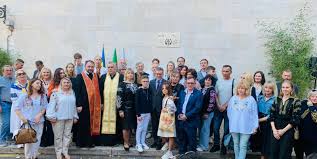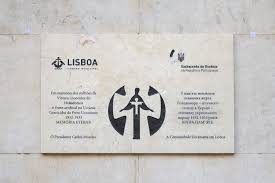Memorial plaque for Holodomor victims unveiled in Portugal

Lisbon: A memorial plaque honoring the millions of victims of the 1932-1933 Holodomor genocide in Ukraine was unveiled in Lisbon on Oct. 23, with Ukraine’s First Lady Olena Zelenska in attendance.
A dispatch from the event was provided by Pavlo Sadokha, Vice-President of the Ukrainian World Congress (UWC) and President of the Union of Ukrainians in Portugal.
“The Portuguese parliament recognized the Holodomor of 1932-1933 as a genocide against the Ukrainian people in 2017,” Zelenska said. “It is crucial that this recognition now has a tangible form that can be seen by all residents and visitors to the country.”

She expressed gratitude at the capital’s city hall and the people of Portugal for grasping the importance of establishing justice, particularly historical justice, and for the need to punish and condemn crimes, regardless of how long ago they occurred.
“Our shared memory serves as a powerful tool in this endeavor,” she said.
Zelenska also highlighted the many commonalities between Ukraine and Portugal.
She noted that the most significant one “is the value of human life.”
Both countries “did not gain this understanding lightly; we have fought for it. We both endured a very challenging 20th century, struggling against dictatorships and oppression,” she added.
After nearly a century, Russian attitudes toward Ukrainians haven’t changed, Sadokha said.
“They still seek to destroy us (not to conquer, but to annihilate us as a nation). And it’s not just Ukrainians,” he said.
More and more European nations are beginning to understand that Ukraine is merely a “staging ground” in the Russian worldview of restoring its global dominance. However, “this awakening is happening too slowly,” adds the UWC Vice President.
“The understanding of the horrific Russian plan for the mass extermination of people, as illustrated by the Holodomor, helps Europeans to more quickly realize the necessity of dismantling the evil empire that perceives the world only through the lens of ‘either us or no one,’” he said.





